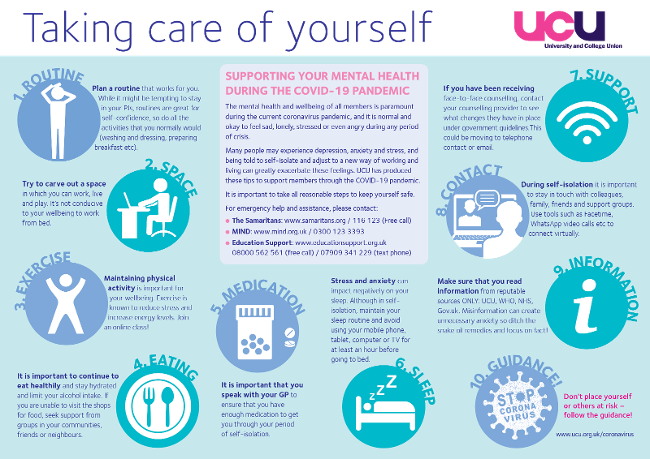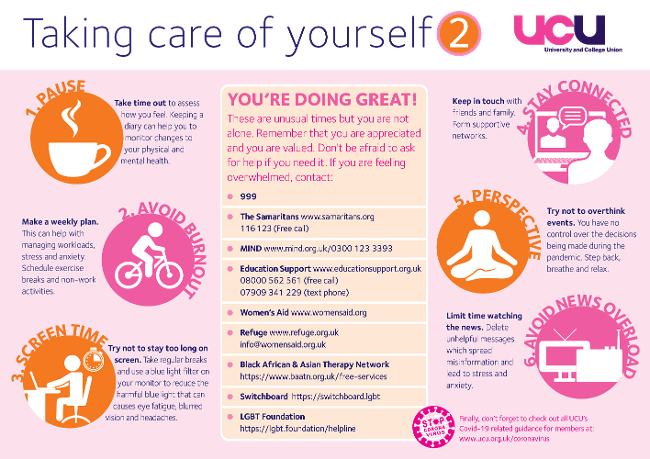
UCU coronavirus advice
16 March 2020
Guidance for members on coronavirus and their rights at work.
See also:
![]() Monkeypox briefing [211kb]
Monkeypox briefing [211kb]
Taking care of yourself

![]() Supporting your mental health during the Covid-19 pandemic [326kb]
Supporting your mental health during the Covid-19 pandemic [326kb]

![]() You're doing great - supporting your mental health during the Covid-19 pandemic [309kb]
You're doing great - supporting your mental health during the Covid-19 pandemic [309kb]
Depending on where you live and work, please refer to the latest safety advice and relevant information on any current restrictions which may apply in England, Scotland, Wales and/or Northern Ireland.
Please contact your branch or regional office if faced with an urgent issue.
Latest
![]() Long Covid branch bargaining guide [285kb]
Long Covid branch bargaining guide [285kb]
![]() 'Living with Covid' guidance for UCU reps [234kb]
'Living with Covid' guidance for UCU reps [234kb]
Working on site
Devolved nations
Any Covid-19 guidance specific to devolved nations can be found on their respective pages:
Further education
Higher education
-
 Risk assessment: hazards and controls in HE [259kb]
Risk assessment: hazards and controls in HE [259kb] -
 Bargaining for better workloads in higher education in response to the Covid-19 pandemic, Jun 20 [171kb]
Bargaining for better workloads in higher education in response to the Covid-19 pandemic, Jun 20 [171kb] -
 Protecting jobs in HE [160kb]
Protecting jobs in HE [160kb] -
 Protecting jobs in Scottish HE [176kb]
Protecting jobs in Scottish HE [176kb]
See also the joint statements and approaches agreed with UCEA about Covid-19:
-
 Raising a concern - what to do if a health and safety concern is identified in higher education [665kb]
Raising a concern - what to do if a health and safety concern is identified in higher education [665kb] -
 Joint statement between UCEA and the HE trade unions on Covid-19 testing for staff, Sep 21 [151kb]
Joint statement between UCEA and the HE trade unions on Covid-19 testing for staff, Sep 21 [151kb] -
 Joint employer and trade union statement on vaccinations for HE staff, Sep 21 [86kb]
Joint employer and trade union statement on vaccinations for HE staff, Sep 21 [86kb] -
 Principles for working safely on campus during the Covid-19 pandemic, Oct 21 [102kb]
Principles for working safely on campus during the Covid-19 pandemic, Oct 21 [102kb]
Prison education:
-
 Covid-19 prison branch H&S advice (Omicron), Jan 22 [342kb]
Covid-19 prison branch H&S advice (Omicron), Jan 22 [342kb] -
 Covid-19 hazards and controls in prisons [292kb]
Covid-19 hazards and controls in prisons [292kb] -
 UCU guidance on prison education online/mixed-media delivery [210kb]
UCU guidance on prison education online/mixed-media delivery [210kb] -
 Near miss reporting guidance [168kb]
Near miss reporting guidance [168kb]
Please also see our prison education page for further information.
Bargaining guidance and advice
-
 Long Covid branch bargaining guide [285kb]
Long Covid branch bargaining guide [285kb] -
 Joint union Long Covid protocol [420kb]
Joint union Long Covid protocol [420kb]
 Long Covid protocol - joint union statement [215kb]
Long Covid protocol - joint union statement [215kb] -
 'Living with Covid' guidance for UCU reps [234kb]
'Living with Covid' guidance for UCU reps [234kb] -
 Covid-19: Ventilation at work (September 2021) [245kb]
Covid-19: Ventilation at work (September 2021) [245kb] -
 ARPS Covid-19 guidance update [259kb]
ARPS Covid-19 guidance update [259kb] -
 BAME members' risk assessment guidance [264kb]
BAME members' risk assessment guidance [264kb] -
 Home working/online teaching [204kb]
Home working/online teaching [204kb] -
 Branch lecture capture guidance [344kb]
Branch lecture capture guidance [344kb] -
 UCU reps briefing on 'long Covid' [211kb]
UCU reps briefing on 'long Covid' [211kb] -
 Hybrid working guidance, Jan 22 [357kb]
Hybrid working guidance, Jan 22 [357kb] -
 Union democracy [234kb]
Union democracy [234kb] -
 Negotiating and bargaining for disabled workers - campaign information [616kb]
Negotiating and bargaining for disabled workers - campaign information [616kb]
See also our health & safety breakfast briefings which include briefings on topics emerging during the pandemic such as long Covid, hybrid working and escalating health & safety concerns.
FAQs
What is coronavirus/Covid-19?
Coronaviruses (CoV) are a large family of viruses that cause illness ranging from the common cold to more severe diseases such as Severe Acute Respiratory Syndrome (SARS-CoV). Coronavirus disease (Covid-19) is the strain discovered in 2019 which had not been previously identified in humans. The primary symptoms are:
- a high temperature - this means you feel hot to touch on your chest or back (you do not need to measure your temperature)
- a new, continuous cough - this means coughing a lot for more than an hour, or 3 or more coughing episodes in 24 hours (if you usually have a cough, it may be worse than usual)
- a loss or change to your sense of smell or taste - this means you've noticed you cannot smell or taste anything, or things smell or taste different to normal.
If I am at work what steps can I take to limit the spread of the virus?
Please see the latest UK government advice on staying safe and helping to prevent the spread.
What responsibilities do institutions have regarding my health?
It is an employer's duty to protect the health, safety and welfare of their employees and other people who might be affected by their business. Employers must do whatever is reasonably practicable to achieve this. This means making sure that workers and others are protected from anything that may cause harm, effectively controlling any risks to injury or health that could arise in the workplace. Employers have duties under health and safety law to assess risks in the workplace. Risk assessments should be carried out that address all risks that might cause harm in your workplace. Employers must give you information about the risks in your workplace and how you are protected, also instruct and train you on how to deal with the risks. Employers must consult employees on health and safety issues. Consultation must be either direct or through a safety representative that is either elected by the workforce or appointed by a trade union. If you have doubts about any aspects of your institution's planning for Covid-19 with specific regard to your health you should raise your concern directly with your manager and make sure your local UCU branch representative is copied in.
See also Thompsons Solicitors briefing on employer and employees' responsibilities in the wake of coronavirus.
I am on a casual contract, what are my rights if classes do not take place?
Non-salaried staff are sometimes not paid if for any reason their classes do not take place or they fall sick. UCU has called for all staff in this situation to be paid as normal based on their regular patterns of work. This is not only fair but will also assist in limiting the spread of the virus.
See also: Protecting precarious workers
What should I do if I am asked to do something that I consider dangerous?
There is a general legal duty, set out within Section 7 of the 1974 Health and Safety at Work Act to 'take reasonable care for the health and safety of himself and of other persons who may be affected by his acts or omissions at work'. If arising from your institution's Covid-19 policy you believe that you or those in your care are in danger, you should raise the issue directly with your immediate line manager and seek their instruction and also immediately contact your local UCU branch. There is a further legal right to leave the workplace, under Section 44 of the 1996 Employment Rights Act, 'in circumstances of danger which the employee reasonably believed to be serious and imminent and which he could not reasonably have been expected to avert'. However, the legal bar for such action is high and heavily dependent on the particular circumstances; members should therefore seek advice from the union BEFORE they do this.
I have been asked to record a lecture or class for playback off campus to students?
Staff should take care to ensure that any recording of a lecture or class is subject to an agreement between UCU and the institution before they agree to allow the archiving of any recording. Where no agreement exists and the terms and conditions of lecture capture are inadequate to protect your rights, members should not sign such terms and should set out clearly that any recordings they make can only be used with their permission and that permission is granted only for the duration of the current crisis. Your local branch will be able to advise you further on any local policies that exist. See also: Intellectual property
I have been asked to work but I am in a vulnerable group. What should I do?
The government has indicated that those aged 70 or over are particularly vulnerable to catching Covid-19. If you are aged over 70 you should contact your line manager to request that you not be required to work in situations that involve face-to-face work and if this request is refused you should raise the matter with your local UCU branch. If you are under 70 but have a relevant underlying health condition or are pregnant you should make a similar approach and ensure you let the union know if your request is refused.
The current pandemic presents additional challenges and barriers for UCU members with disabilities and there is
![]() some specific advice here [120kb].
some specific advice here [120kb].
There have been two key pieces of guidance on pregnancy and coronavirus:
- the UK government issued this guidance on social distancing for pregnant women and other vulnerable groups
- the Royal College of Obstetricians and Gynaecologists, Royal College of Midwives and others have also issued guidance on pregnancy and coronavirus.
Maternity Action (who UCU affiliates) is a useful source for pregnancy and maternity rights in general.
I am an international member of staff or student on a visa. How would non-attendance due to coronavirus affect me?
We asked all employers to notify all relevant staff of the revised Home Office guidance regarding absence of those on Tier 2, 4 and 5 visas due to Covid-19. We have also written to employers to seek their assurance that, in line with the recently revised guidance from the Home Office, they will not take any visa compliance action against students or employees who are unable to attend their studies/work as a result of a coronavirus outbreak.
See Covid-19 information for international staff for more detailed information.
How will my pension be affected?
Most members working from home will not see any effect on their pension but those who were placed on furlough or who volunteered in the NHS may need to check the effect on their benefits. UCU have been involved talking to the schemes to get protection for members. The links below will take you to the webpage of each scheme where you should find answers to your questions. Any other queries please contact pensions@ucu.org.uk
- USS
- Teacher's Pension (England & Wales)
- LGPS
- Scottish Teachers Superannuation Scheme
- Northern Ireland Teachers Pension Scheme
I am due to travel outside the UK as part for my work. What should I do?
Please seek the advice of the Foreign Office on the Covid-19 situation in the country that you are travelling to.
See also:
- PrintPrint this page
- Share
